
G’day and welcome to Partakers Christian Podcasts! Join us for uplifting Bible teaching, inspiring readings, heartfelt worship, powerful prayers, and fascinating church history. Whether you’re new to faith or growing deeper in your journey, we’re here to encourage and equip you. 🎧 Tune in, interact, and be inspired—wherever you are in the world.
Episodes

Sunday Apr 25, 2021
Exploring Islam 06
Sunday Apr 25, 2021
Sunday Apr 25, 2021

Exploring Islam
6. Allah versus God - The Oneness of Allah
No description of Allah would be complete without emphasising the oneness of his being. His superiority in all things immediately sets himself as unique. Qur’an 112 – ‘Say: He is Allah, the One! Allah, the Eternally Implored by all! He begets not nor was begotten. And there is none comparable to him.’
There are also verses which specifically assert that Allah is different from the Trinitarian view of God in Christianity, which Islam understands as being in fact three gods not one. Quran 4:171b – ‘So – believe in Allah and his messengers, and say not “Three” – Cease! (It is) better for you! – Allah is only One God. Far is it removed from his Transcendent Majesty that he should have a son.’
When Muhammad was first proclaiming these verses, which would later become the Qur’an, he was attempting to move the Arab people away from polytheism, the belief and practice in worshipping many gods. In conjunction with his understanding that Christians had corrupted their message from Allah given by the Islamic prophet Jesus to include Jesus’ divinity, it is understandable that there was a real need for an explicit difference to be made with the Islamic perspective of Allah.
For Christianity, the concept of God is inseparably bound to the term ‘Trinity’, that of God the Father, the Son Jesus Christ, and the Holy Spirit. To believe in such a doctrine is for a Muslim to commit one of the worst sins defined as shirk, to associate anything else to the one and only Allah. This primary difference in belief between these religions centered on the person of Jesus Christ can act as one of the tallest barriers preventing useful religious discussion, and ultimately for a Muslim to convert to Christianity.
Right Mouse click or tap here to save this as an audio mp3 file
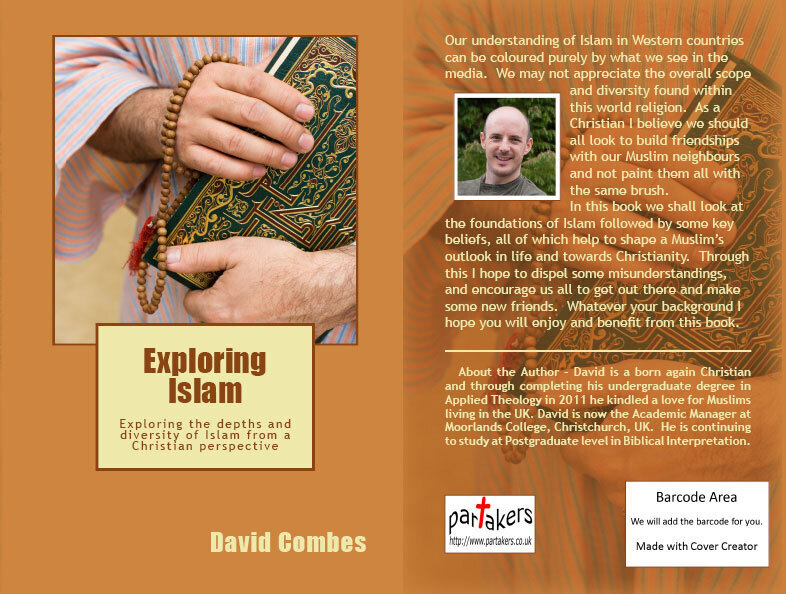
This now is available to buy as a book, Kindle or Paperback, on Amazon :
UK/Europe - http://www.amazon.co.uk/Exploring-Islam-exploring-diversity-Christian/dp/1507774567/
USA - http://www.amazon.com/Exploring-Islam-exploring-diversity-Christian/dp/1507774567/
Click or tap on the appropriate link below to subscribe, share or download our iPhone App!![]()
![]()
![]()
![]()
![]()
![]()
![]()

Saturday Apr 24, 2021
Exploring Islam 05
Saturday Apr 24, 2021
Saturday Apr 24, 2021

Exploring Islam
5. Allah versus God - Merciful and Mighty
Welcome to ‘Exploring Islam’. We are now starting to look at some of the beliefs of Islam and see how they are similar or different to those of Christianity. For this session we shall examine the concept of Allah, which is simply the Arabic word for God and existed before Islam. These words are the same linguistically, but what about the characteristics behind them between the Islamic Allah and the Christian God? Two of the most important attributes of Allah repeated many times in the Qur’an is that of his mercy and his greatness.
The opening verses in the Qur’an begin; Quran 1:1-4 – ‘In the name of Allah, the Entirely Merciful, the Especially Merciful. [All] praise is [due] to Allah, Lord of the worlds - The Entirely Merciful, the Especially Merciful, Sovereign of the Day of Recompense.’ Allah is seen as the source of all benefits in life through his merciful will and action. Allah forgives sins and allows followers into Paradise all in accordance with his great mercy. Much on the surface seems similar to that of Christianity’s God. God is revealed as full of compassion and mercy (James 5:11), and the culmination of these attributes is seen in the saving work of Jesus; Ephesians 2:4-5 – ‘But because of his great love for us, God, who is rich in mercy, made us alive with Christ even when we were dead in transgressions.’
Within Islam, Allah operates his mercy and indeed all action in accordance to his will. This is not dissimilar to God in Christianity. However, in Islam as Allah is essentially unknowable it is difficult if not impossible to actually know or even predict how Allah is going to act. Muslims however do demonstrate great faith in their commitment during adversity believing that Allah’s will resides in every experience of life, positive or negative.
However, as we have seen previously, that there is a level of uncertainty and lack of control on the part of the follower. As a result some turn to alternative means like Folk Islam in an attempt to influence their situation. It would be unfair to claim the opposite for Christianity, that God’s will and plans for us are so crystal clear that we do not experience times of doubt or fear. However, speaking as a Christian, God reveals his nature to be unchanging in the Bible, and through the personal relationship which I have cultivated with Him I feel I can draw solace in difficult times knowing that Jesus is with me (Hebrews 13:5).
Right Mouse click or tap here to save this as an audio mp3 file

This now is available to buy as a book, Kindle or Paperback, on Amazon :
UK/Europe - http://www.amazon.co.uk/Exploring-Islam-exploring-diversity- Christian/dp/1507774567/
USA - http://www.amazon.com/Exploring-Islam-exploring-diversity- Christian/dp/1507774567/
Click or tap on the appropriate link below to subscribe, share or download our iPhone App!![]()
![]()
![]()
![]()
![]()
![]()
![]()

Friday Apr 23, 2021
Exploring Islam 04
Friday Apr 23, 2021
Friday Apr 23, 2021

Exploring Islam
4. Allah versus God - Essentially Unknowable
Welcome to ‘Exploring Islam’. We are now starting to look at some of the beliefs of Islam and see how they are similar or different to those of Christianity. For this session we shall examine the concept of Allah, which is simply the Arabic word for God and existed before Islam. These words are the same linguistically, but what about the characteristics behind them between the Islamic Allah and the Christian God?
Essentially unknowable.
This may seem a rather negative launch point but it is an important concept to realise within Islam. The Qur’an does not reveal Allah rather it shows how people should live in accordance to his will. He is essentially transcendent to all, he is above and beyond everything we do know or could possibly understand.
Qur’an 16:74 – ‘So do not assert similarities to Allah. Indeed, Allah knows and you do not know.’
Humanity’s position in regard to its creator is that of a slave with a master. There is no possibility for a personal relationship like that found in Christianity where the analogy is a divine Father with His children. However, this is not to say that Allah is disinterested in his creation, humanity, or his Muslim followers, far from it.
In fact the Qur’an describes Allah as being exceptionally close:
Qur’an 50:16 – ‘And We have already created man and know what his soul whispers to him, and We are closer to him than [his] jugular vein.’
This description of Allah is understood to be more of an awareness of everything that is happening in creation. Allah is all knowing and all powerful, just as Christianity’s God is. The most significant difference between them is that in orthodox Islam Allah makes no attempt to personally reveal himself or to reach out to humanity in the same way as God does.
In Christianity, God loves his creation to such a degree that he becomes a man in the person of Jesus Christ in order to fully reveal to us his nature (Colossians 2:9), how we are to live, and ultimately provide the route for our forgiveness - Hebrews 1:3 – ‘The Son is the radiance of God’s glory and the exact representation of his being, sustaining all things by his powerful word.’
However, just a cursory glance through the Qur’an and you will notice there are many adjectives used to describe Allah and so Muslims are given some concepts which to form their beliefs and service, the 99 names of Allah.
Right Mouse click or tap here to save this as an audio mp3 file

This now is available to buy as a book, Kindle or Paperback on Amazon :
UK/Europe - http://www.amazon.co.uk/Exploring-Islam-exploring-diversity-Christian/dp/1507774567/
USA - http://www.amazon.com/Exploring-Islam-exploring-diversity-Christian/dp/1507774567/
Click or tap on the appropriate link below to subscribe, share or download our iPhone App!![]()
![]()
![]()
![]()
![]()
![]()
![]()

Thursday Apr 22, 2021
Exploring Islam 03
Thursday Apr 22, 2021
Thursday Apr 22, 2021

Exploring Islam
The Qur’an and Hadith
Muhammad’s miraculous sign as a prophet was not healing, or feeding of the five thousand, but instead the transmission of Allah’s message to the Arab people, the Qur’an. In this podcast we shall briefly look at this and the additional Islamic writings called the Hadith.
Origins and layout of the Qur’an
The Qur’an as we now read it, was not written and collated until after Muhammad’s death. Whilst he was proclaiming his message from Allah to the people it was common for scribes to write down what he said, but most Islamic scholars agree that this was not systematic. Unlike the Christian Bible which spans many years, cultures and authors, the material found in the Qur’an originated from one person within their twenty year ministry. The nature of the text is very poetic in content and structure so much so that many native Arabic speaking peoples consider it a higher form of the language, as well as an older and now disused dialect.
It is believed that Muhammad received the material for the Qur’an from Allah via His messenger the Angel Gabriel, otherwise known as the ‘the holy spirit’. These visions were intense affairs where the prophet was sometimes seen coming out of a trance like state. After his death it is no surprise that there was some diversity in the form and detail of some of the written records of Muhammad’s message. The third Caliph, or leader of Islam, Caliph Uthman appointed in 644AD twelve years after Muhammad’s death set out to collate and establish a single version of the prophet’s message which remains today. The overall layout of the Qur’an is somewhat different to that of the Christian Bible.
The Suras were ordered not chronologically but in size, the longest first running down to the shortest. The only exception is Sura 1 which is seen as a special opening prayer to the Qur’an. In a general sense this structure placed the later Suras, the ones received whilst Muhammad was living in Medina, first as they were the longest.
Most English translations of the Qur’an have opening comments to each Sura which briefly describe its timing. The Suras themselves are not specific to a particular topic or event, but contain within them a variety of different subjects and exhortations. It may start by talking about the role of women, then move onto accounts of Abraham, and perhaps finish discussing heaven or Paradise. This shift within the Sura makes for difficult reading if unfamiliar with the Qur’an, and the change from one topic to the next does not necessarily mean they should be connected via a general principle or lesson.
Unlike the Christian Bible which is believed to be unified in its truth and content, passages in the Qur’an can come under abrogation. A later passage regarding a particular situation or topic can supersede an earlier instruction. An example might be the growth over time in the number of wives a Muslim may have. As a Muslim this facet of the text is not viewed as a negative drawback but simply as the way Allah has chosen to communicate.
Authority of the Qur’an
Despite the origins of the Qur’an, the words within the book were considered by Muhammad and are still by Muslims to be the actual words of Allah. Even though they were transmitted through a human prophet they contain no reflection or influence by him. In fact, the message contained within the Qur’an originated according to Hadith from an eternal tablet located in heaven. This everlasting tablet of Allah’s words was the source of all the previous books from previous Islamic prophets, Moses and the Torah, David and the Psalms, Jesus and the Gospel. Therefore, the Qur’an itself is handled with great respect. Unlike the Christian Bible it ceases to be the Qur’an when it is translated out of the original Arabic into say English, hence these are typically called ‘The Meaning of the Glorious Qu’ran’. The Qur’an is never placed on the floor, never held below waist height when being carried, can never have anything placed on top of it, and is certainly never written in. All Muslims today consider their copy of the Qur’an to be one of their most precious possessions and as such any non-Muslim should display some level of respect even if they do not believe in its claims.
However, it is this authority stemming from its eternal origins which, in my opinion, poses some food for thought for Muslims. Anything eternal can only be equated to Allah, and therefore what exactly is this heavenly tablet? Many everyday Muslims may not have considered this question and if presented with it may react with offense. Caution and sensitivity is needed or else we risk raising only more barriers.
What about the Hadith?
Along with the Qur’an, what Muhammad said and did outside of the specific proclamations from his Angelic visions have been collated and are called the Hadith. As a political and religious leader he was faced with many different and challenging situations and questions from his followers which he sought to answer. These sayings were recorded either during his ministry or afterwards and form the backbone for what was subsequently structured as Sharia law, the overall structure and guidance for all aspects of Islamic life. Unlike the Qur’an there are today different Hadiths written by different Islamic scholars and have different providence.
The reliability of a Hadith is based upon the length and character of the witnesses who passed on the information before it was written down. Some which today are considered popular and reliable are authored by Bukhari, and separately by a scholar simply called Muslim. Many put a lot of unquestioned trust and authority into the teachings and principles found in the Hadith, sometimes equalling that given to the Qur’an. This is despite the orthodox position that it is only the Qur’an which can be considered the actual authoritative words of Allah. The status of Muhammad as the seal of all prophets has naturally led to this popular view of the Hadith, and many Muslims which I have met have raised the prophet, rightly or wrongly, onto the same ethical and moral pedestal as Christians do for Jesus. Next time we shall look at the different expressions of Islam found today characterised in the divide between Sunni and Shia, but also in Sufism and Folk Islam.
Right Mouse click or tap here to save this as an audio mp3 file

This now is available to buy as a book on Amazon :
UK/Europe - £5 - http://www.amazon.co.uk/Exploring-Islam-exploring-diversity-Christian/dp/1507774567/
USA - $7 - http://www.amazon.com/Exploring-Islam-exploring-diversity-Christian/dp/1507774567/
Click or tap on the appropriate link below to subscribe, share or download our iPhone App!![]()
![]()
![]()
![]()
![]()
![]()

Wednesday Apr 21, 2021
Exploring Islam 02
Wednesday Apr 21, 2021
Wednesday Apr 21, 2021

Exploring Islam
Origins of Islam
Today we shall unpack more of what Islam means to those who follow the faith, and how it relates to Christianity in similarity and difference. Our first step however will be to briefly appreciate its origins!
Society Muhammad was born into
The founder of Islam was the prophet Muhammad born in the city of Mecca (now in Saudi Arabia) around 570AD. The family he was born into was of some importance in the city however his father had died before he was born and soon after when he was six years old so did his mother. The conditions in Arabia and for the Arab people before Muhammad was a complex network of nomadic tribes who lived and moved around the desert regions. Loyalties were clear cut and rules for living were easy to understand as your duty and honour were simply bound to your clan.
But it wasn’t long before these tribes began to congregate and towns and then a few cities were forged. Suddenly with a close community filled with a mixture of clans the established framework and social order was threatened. Orphans and the poor were increasingly ignored and as resources and power became sought after commodities the moral fabric of what was a simple nomadic life became vulnerable. It is important to realise that this is the social setting which Muhammad was born into and the problems which he witnessed. The religious situation of the Arab people leading up to Muhammad was a cauldron of idol worship, spirit worship, and sun, moon and star worship. There was a community of Jews living in Mecca at the time, and nearby countries like Ethiopia were almost entirely Christian. In fact the Ka’aba, which is the large cubic structure in Mecca today and forms the focus of the Hajj pilgrimage, was already old by the time of the Islamic prophet. It was used to house hundreds of idols, but later in Muhammad’s life when he returned from Medina to Mecca he claimed the structure for Islam.
The beginnings and growth of Islam
Around 610AD Muhammad received the first of what was to be seven visions of revelation from Allah delivered through the messenger Angel Gabriel and would form the Qur’an after his death. The first one was famously in a desert cave which he commonly used as a retreat. From here on Muhammad began proclaiming his message from Allah to the Arab people. It was one which called them to abandon their idol worship and commit to monotheism. But it wasn’t limited to being only a religious message but also a political and social structure which would alleviate the injustices Muhammad perceived and one which would please Allah. He found he had only some followers of this new faith and eventually in 622AD in fearing for his life he fled to the nearby city of Medina who welcomed him with open arms. Very quickly he established a political leadership in Medina, his followers grew, but the opposition in Mecca remained.
After eight years of petty killings between the two cities, this is where jihad has its roots, Muhammad with his men went to Mecca desiring a peaceful pilgrimage, but instead the officials surrendered in fear of their safety and the city became Islamic. During 632AD Muhammad died whilst living in Medina and had left in his wake a large political empire as well as a new religion. However, he had failed to declare a successor. He was the final prophet, the seal of the prophets, and so another one was not sought, but instead a political leader. There was much struggle within the Islamic believers in Medina and despite a successor being appointed a division was formed which was to remain under the surface and come out later through much blood shed in the creation of Sunni and Shi’a Muslims. The Islamic empire expanded exponentially over subsequent years and it is important to remember that this all began with the twenty year prophetic service of one man Muhammad.
The growth was achieved primarily through plundering neighbouring towns and cities and when control was achieved the Islamic faith was a prerequisite for the indigenous people to stay. The only exception at the start were for Jews and Christians who were tolerated as second rate citizens, but later on even this faded. However, more peaceful conversions were happening at the same time through Muslims sharing their faith whilst working the trade routes across the continent and into Asia. What Muhammad had achieved was a first for the Arab people, a sense of unity and loyalty to more than just their individual clan. Now it was to the one god Allah and his prophet, and this provided the opportunity for growth and prosperity.
Islam before Muhammad
What we have just discussed paints a very quick picture of the beginnings of Islam as we currently would know it. However, from a Muslim’s perspective we must appreciate that Islam existed before Muhammad. Islam when translated simply means one who voluntarily submits to Allah, which is simply the Arabic word for God. Muhammad was the last prophet, the one sent to the Arabs. Previous prophets from Allah went to the Jews in the form of Abraham, Moses, David and many more. For the Greek people Jesus was Allah’s prophet.
All of these familiar names were in fact Muslims as declared in the Qur’an and their revelations to their respective peoples were of a similar type to that of the Qur’an. Moses brought the Torah, David the Psalms, and Jesus the Gospel. However, the respective peoples corrupted these books and didn’t live as Allah would have wanted; hence the current versions of these holy books are not considered by Muslims as original. This explains how a Muslim views a Christian. They have corrupted the sacred revelation given by Jesus to include things like the Trinity and divinity of him, and so are in need of repentance.
For a Muslim Christianity was born out of this dishonest process and did not exist before or because of the prophet Jesus. Next time we shall consider in more detail the nature, design, and layout of the Qur’an and Hadith, Muhammad’s great religious legacy.
Right Mouse click or tap here to save this as an audio mp3 file

This now is available to buy as a book on Amazon at :
UK/Europe - £5 - http://www.amazon.co.uk/Exploring-Islam-exploring-diversity-Christian/dp/1507774567/
USA - $7 - http://www.amazon.com/Exploring-Islam-exploring-diversity-Christian/dp/1507774567/
Click or tap on the appropriate link below to subscribe, share or download our iPhone App!![]()
![]()
![]()
![]()
![]()
![]()

Tuesday Apr 20, 2021
Exploring Islam 01
Tuesday Apr 20, 2021
Tuesday Apr 20, 2021

Exploring Islam
Introduction
About Myself
Welcome to this new series where we shall be exploring the depths and diversity of Islam found in our world today. I am a born again Christian living in the UK and I have found that our understanding of this faith is somewhat lacking in Churches and in the general public. Whilst attaining my undergraduate degree in Applied Theology I studied Islam from an academic perspective and spent time in several UK cities meeting with Muslims of all types from many different cultures in their homes and in the Mosques. I am now occupied in looking after our one year old son and studying at Postgraduate level in Biblical Interpretation. But Islam still remains a personal interest of mine, and as a Christian we should be looking to build friendships with our Muslim neighbours and never be afraid of learning something new about their faith whilst always being prepared to sensitively share our own. My hope is that whatever your background you will enjoy and benefit from this podcast series.
Introduction To The Podcast Series
The media can deliver much of our experience and understanding of the Islamic faith from far reaching locations across the world. However, the tragedy of this is for most us who do not know Muslims personally we commonly paint them with the same brush, assume that they are all ‘out to get us’ or seem so different and unknown that we avoid them. This series will attempt to fill in the potential gaps and maybe even correct some misunderstandings all done in the spirit that ‘loving our neighbour’ includes those of a different faith or ethnic origin. However, it must be appreciated from the outset that we embark on a journey to better understand one of the largest world religions which despite its own ambitions for unity and uniformity contains significant diversity of expression. Here is our first lesson; there can be a big difference between official orthodox Islam found in the text books, and the understanding and practice of individual Muslims across the world. I must qualify that what I bring to these podcasts is based not only on my own academic study of Islam but also in meeting with individual Muslims living in the UK from different cultural backgrounds. Much of what is accessible to Christians regarding Islam is written by Christians on the mission field and this is of great worth. However, I have found that first hand conversations with the Muslims who live nearby provides a unique perspective which will help us pray for them, build friendships, witness in love, and ultimately accept them into the Church as new believers. The journey starts here.
Right Mouse click or tap here to save this as an audio mp3 file

This now is available to buy as a book on Amazon at £5 :
UK/Europe - £5 - http://www.amazon.co.uk/Exploring-Islam-exploring-diversity-Christian/dp/1507774567/
USA - $7 - http://www.amazon.com/Exploring-Islam-exploring-diversity-Christian/dp/1507774567/
Click or tap on the appropriate link below to subscribe, share or download our iPhone App!![]()
![]()
![]()
![]()
![]()
![]()
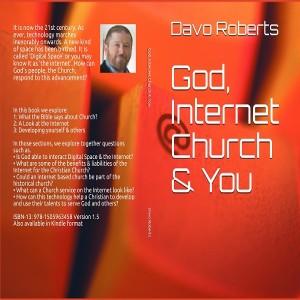
Sunday Feb 07, 2021
God, Internet Church and you
Sunday Feb 07, 2021
Sunday Feb 07, 2021
PulpTheology Book
God, Internet Church & You
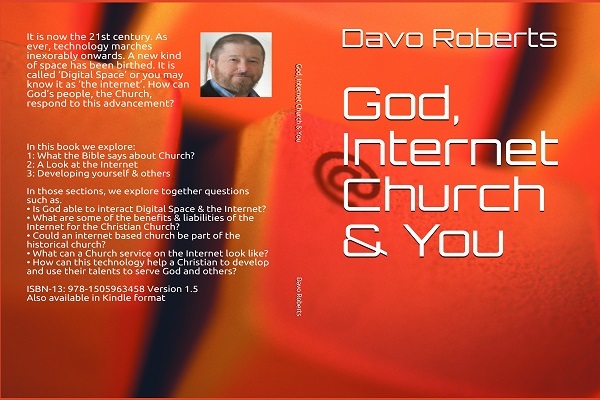
Due to lockdown or quarantine due to the CoronaVirus / COVID-19 Pandemic, Church has moved to using the Internet for its services to the world. In this little book we seek to answer why the Church is using the Internet, as well as exploring together ways in which we can respond.
Here are some of the questions we will explore together:
- What is Digital Space & the Internet?
- Why should the Church be on the Internet and how?
- Isn't Church on the Internet just a modern form of the ancient heresy of gnosticism?
- Is God able to interact there?
- For the Christian, what are some of the liabilities and virtues of the Internet?
- Could an internet based church be part of the historical church?
- What can a Church service on the Internet look like?
- How can this technology be used, so that you as a Christian, can use your talents and serve God on the Internet in the 21st century?
Click or Tap here to listen to or save this as an audio mp3 file
~
You can purchase this book at Amazon on this link:
Click or tap on the appropriate link below to subscribe, share or download our iPhone App!![]()
![]()
![]()
![]()
![]()
![]()
![]()
![]()
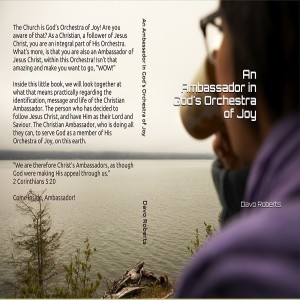
Thursday Aug 27, 2020
Pulp Theology 10
Thursday Aug 27, 2020
Thursday Aug 27, 2020
PulpTheology Book
An Ambassador in God's Orchestra of Joy
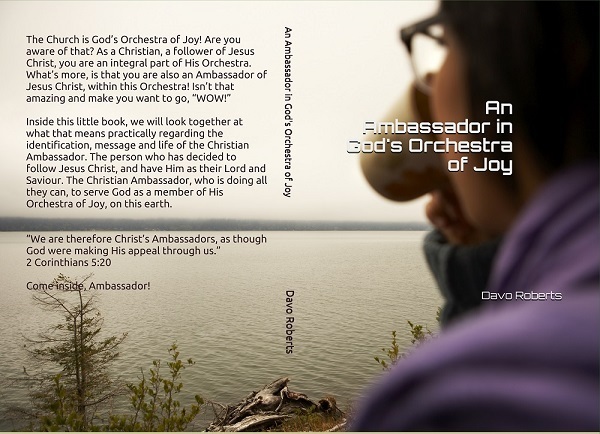
An Ambassador is an official and accredited representative of their own sovereign state to another place or country. The Ambassador speaks not for themselves but represents the ideals, thoughts and actions of the one who sent them and with their authority.All Christians, as Disciples of Jesus Christ, are Ambassadors for Jesus Christ into the world in which we live.
Therefore throughout this book, we use both words, Ambassador and Disciple, in relation to the Christian. As Ambassadors for Jesus Christ, we are to be His representatives here on earth. We are His Church, which is an Orchestra of Joy.The Christian Ambassador has a joyous message to present to people about how people can be reconciled with God. A message to all people, of all nations, of all time, without favouritism or corruption.
As Christian Ambassadors, we are sent by our Lord Jesus Christ, into the world, in order to live our lives for Him and Him alone. Inside this book, we look at 6 main characteristics of the life of the Christian Ambassador:
1. The Ambassador's Identification // 2. The Ambassador's Message
3. The Ambassador’s New Life // 4. The Ambassador's Serving Life
5. The Ambassador’s Devotional Life // 6. The Ambassador's Uncompromising Life
The Disciple of Jesus Christ, the Christian, is God's Ambassador, as exhorted by the Apostle Paul in 2 Corinthians 5:20-21:
20 We are therefore Christ’s Ambassadors, as though God were making His appeal through us. We implore you on Christ’s behalf: be reconciled to God. 21 God made Him who had no sin to be sin for us, so that in Him we might become the righteousness of God.
Click or Tap here to listen to or save this as an audio mp3 file
~
You can purchase this book at Amazon on this link:
Click or tap on the appropriate link below to subscribe, share or download our iPhone App!![]()
![]()
![]()
![]()
![]()
![]()
![]()
![]()

Thursday Aug 20, 2020
Pulp Theology 20
Thursday Aug 20, 2020
Thursday Aug 20, 2020
PulpTheology Book
When Love Hits Town
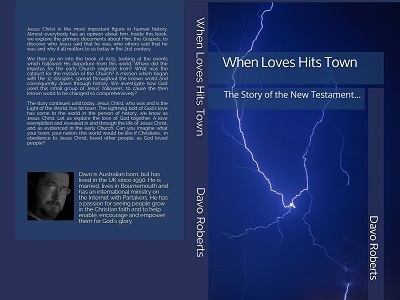
Jesus Christ is the most important figure in human history. Almost everybody has an opinion about him. Inside this book, we explore the Gospels to discover who Jesus said that he was, who others said that he was and why it all matters to us today in the 21st century.
We then go on into the book of Acts, looking at the events following His departure. What, or rather, who gave the impetus for the early Church? What was the catalyst for the mission of the Church? A mission which began with the 12 disciples, spread throughout the known world and consequently down through history. We investigate how God used this small group of Jesus' followers, to cause the then known world to be changed so comprehensively?
The story continues until today. Jesus Christ, who was and is the Light of the World, has hit town. The lightning bolt of God’s love has come to the world in the person of history, we know as Jesus Christ. Let us explore the love of God together. A love exemplified and revealed in and through the life of Jesus Christ, and as evidenced in the early Church. Can you imagine what your town, your nation, this world would be like if Christians, in obedience to Jesus Christ, loved other people, as God loved people?
"When Love Hits Town" available on Amazon in paperback or Kindle with ISBN: 9781724867414
Click or Tap here to listen to or save this as an audio mp3 file
~
You can purchase this book at Amazon USA on this link:
You can purchase this book at Amazon UK on this link:
Click or tap on the appropriate link below to subscribe, share or download our iPhone App!![]()
![]()
![]()
![]()
![]()
![]()
![]()
![]()
![]()
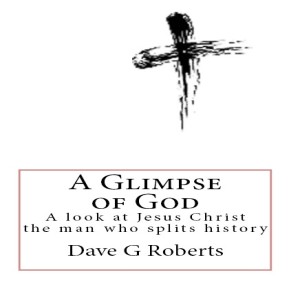
Thursday Jul 30, 2020
Pulp Theology 01 - A Glimpse of God
Thursday Jul 30, 2020
Thursday Jul 30, 2020
PulpTheology Book
A Glimpse of God
 The WOWFactor of Jesus Christ! It’s all there in black and white. To be agog is to be filled with excitement and expectation! Hence our title of this book exploring the man who splits history - Jesus Christ! Looking primarily at what the Bible says about him but also glimpsing briefly at the evidence from outside the Bible said about this most amazing of men! His birth we celebrate worldwide at Christmas and his death & resurrection we celebrate at Easter.
The WOWFactor of Jesus Christ! It’s all there in black and white. To be agog is to be filled with excitement and expectation! Hence our title of this book exploring the man who splits history - Jesus Christ! Looking primarily at what the Bible says about him but also glimpsing briefly at the evidence from outside the Bible said about this most amazing of men! His birth we celebrate worldwide at Christmas and his death & resurrection we celebrate at Easter.
For many people today, as well as down through history, Jesus Christ is the most important figure in human history. Almost everybody has an opinion about him - whether positive, negative or indifferent. Come inside and let us explore together the primary documents about him, the Bible, who people say he was, what he did and the relevancy of Jesus Christ for you today! Suitable for those exploring Christianity as well as those who have been a Christian for a short while or for many years! come inside this book and find out more abuot this amazing God-man - Jesus Christ.
Click or Tap here to listen to or save this as an audio mp3 file
~
You can purchase this book at Amazon on this link:
Click or tap on the appropriate link below to subscribe, share or download our iPhone App!![]()
![]()
![]()
![]()
![]()
![]()
![]()
![]()
![]()
